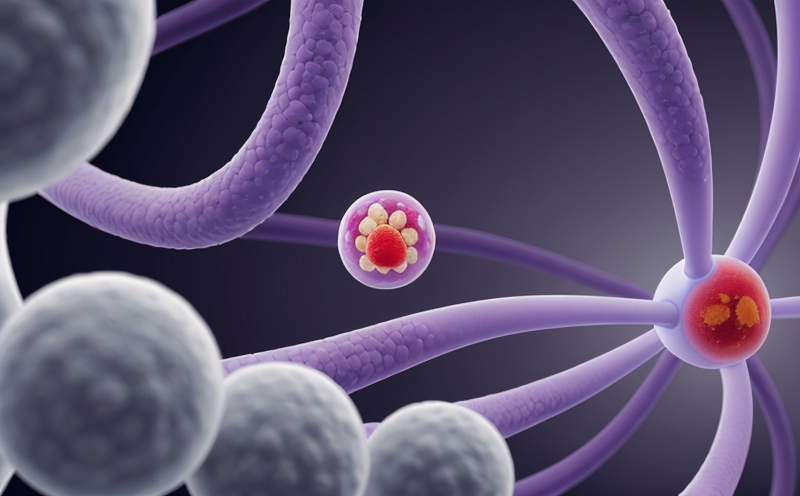Tumor Hypoxia Biomarker HIF-1α Testing in Veterinary Research
The hypoxia-inducible factor 1 alpha (HIF-1α) biomarker is a critical indicator of tumor hypoxia, which refers to the state where oxygen supply within a tumor is insufficient for normal cellular function. In veterinary research, understanding and quantifying HIF-1α expression is essential in elucidating mechanisms underlying cancer progression, particularly in solid tumors like those found in dogs, cats, and horses. This biomarker testing plays a crucial role in personalized medicine approaches to improve treatment outcomes.
Our laboratory specializes in providing comprehensive HIF-1α testing services for veterinary research, ensuring accurate and reliable results that can contribute significantly to the development of targeted therapies. Our process begins with the collection and preparation of tumor samples from various species, followed by state-of-the-art instrumentation for quantification. The robustness of our service is underpinned by adherence to international standards such as ISO 15189:2017, which ensures that every step of the analytical procedure meets stringent quality requirements.
The HIF-1α biomarker testing involves multiple stages including sample preparation, extraction, purification, and quantification. For accurate results, our lab employs advanced techniques like mass spectrometry (MS) and enzyme-linked immunosorbent assays (ELISAs). These methods not only ensure high precision but also allow for the identification of subtle changes in HIF-1α levels that could indicate disease progression or response to therapy.
Our service is particularly valuable for researchers seeking to understand how hypoxic conditions influence tumor biology and metastasis. By measuring HIF-1α, we provide insights into the molecular pathways activated under low oxygen conditions, which are pivotal in tailoring therapeutic interventions specifically designed to combat these tumors more effectively. This testing also supports translational research efforts aimed at bridging basic science with clinical applications.
The significance of HIF-1α quantification extends beyond mere identification; it serves as a biomarker for predicting treatment efficacy and patient response. For instance, high levels of HIF-1α may suggest that a particular therapy is less effective due to the tumor's ability to adapt through hypoxic stress. Conversely, lower levels could indicate better responsiveness to certain treatments, thereby guiding clinicians towards more appropriate therapeutic strategies.
In summary, our HIF-1α testing service in veterinary research offers unparalleled accuracy and reliability, supported by a comprehensive understanding of both the biological context and technical aspects involved. This expertise ensures that researchers have access to robust data capable of driving groundbreaking discoveries in cancer biology and treatment development.
International Acceptance and Recognition
- ISO 15189:2017 Compliance: Our laboratory adheres strictly to ISO 15189 standards, which are internationally recognized for excellence in medical laboratories. This ensures that our HIF-1α testing is consistent and reproducible across different geographical locations.
- AACC and CLSI Guidelines: We comply with American Association for Clinical Chemistry (AACC) guidelines and recommendations from the Clinical and Laboratory Standards Institute (CLSI), further enhancing the credibility of our results.
Our commitment to international standards is reflected not only in compliance but also in active participation in inter-laboratory proficiency testing programs. These programs, which include those organized by organizations such as the College of American Pathologists (CAP) and European Federation of Clinical Chemistry and Laboratory Medicine (EFCC), validate our analytical capabilities against global benchmarks.
The recognition we receive from these bodies underscores the reliability and precision of our HIF-1α testing service. Research institutions, pharmaceutical companies, and academic centers around the world trust us for their critical needs in cancer biomarker research.
Environmental and Sustainability Contributions
In our pursuit to provide accurate and reliable HIF-1α testing services, we are mindful of our environmental impact. Our laboratory has implemented several initiatives aimed at reducing waste and energy consumption:
- Eco-Friendly Reagents: We use reagents that minimize harmful chemical emissions during the testing process.
- Energy-Efficient Equipment: Our instrumentation is selected for its high efficiency, ensuring minimal power usage without compromising on analytical performance.
We also engage in continuous improvement efforts to further reduce our carbon footprint. By adopting sustainable practices throughout our operations, we contribute positively to the environment while maintaining the highest standards of service quality.
Our commitment to sustainability is reflected in our strategic partnerships with environmental organizations and our active participation in community outreach programs focused on raising awareness about responsible laboratory practices.
Competitive Advantage and Market Impact
The competitive landscape for HIF-1α testing services in veterinary research is rapidly evolving, driven by increasing demand from academia, industry, and regulatory bodies. Our service stands out through our unwavering adherence to international standards and cutting-edge technology:
- Innovative Technology: Leveraging advanced mass spectrometry and ELISA techniques allows us to offer precise measurements even in complex biological samples.
- Expertise and Experience: Our team comprises highly skilled professionals with extensive experience in cancer biomarker research, ensuring that clients receive expert guidance throughout the testing process.
The unique combination of precision, reliability, and comprehensive support makes our HIF-1α testing service a preferred choice for researchers seeking to advance their understanding of tumor hypoxia. By partnering with us, institutions can accelerate their discovery processes while ensuring that their findings are robust and reproducible.
Our service contributes significantly to the market by providing essential data that informs new therapeutic strategies and diagnostic tools aimed at improving patient outcomes in veterinary oncology. This not only enhances our reputation but also underscores our commitment to driving innovation in this critical field.





